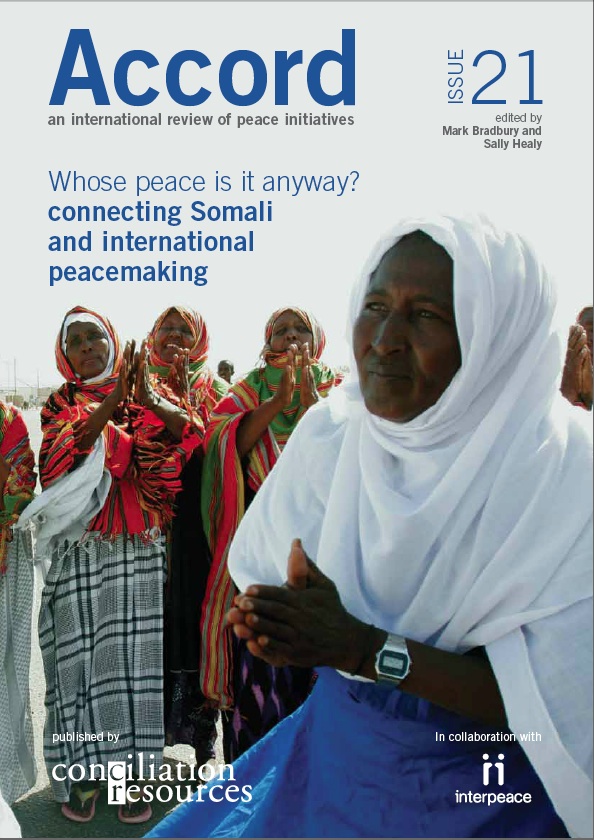The Somali government formed in Mbgathi in Kenya in October 2004 could not agree on whether to relocate to Mogadishu, where the new president, Abdulahi Yusuf, was not popular. Even before it had left Kenya, Mogadishu was a divisive issue for the Transitional Federal Government (TFG), with some of the top leadership claiming that the city had to be cleared of opposition forces before it could relocate there.
President Yusuf opted for a temporary base first in Jowhar and later in Baidoa. He also called for the deployment of a large African Union peacekeeping force to support his administration, an idea abhorred by many in Mogadishu.
A group of parliamentarians and cabinet members led by the new speaker, Sharif Hassan Sheikh Aden, went to Mogadishu in March 2005 to prove to the government that it could relocate there. They challenged the inhabitants of Benadir to participate in the formation of a new administration.
Consultations led by civil society and business communities resulted in an agreement to form a technical committee to propose a way forward for the Benadir region. After two months of intensive dialogue, the Mogadishu Security and Stabilisation Plan (MSSP) was produced. The plan emphasised two main needs – the pacification of the city and establishment of a regional administration.
The MSSP initially focused on security issues in order to assist in the formation of an administration that would enable the new government to function in the capital. The major components of the plan were: 1) dismantling all roadblocks in the city; 2) cantoning armed militia outside the city; 3) selecting a local council to elect a governor; and 4) establishing the administration’s executive branch, the police and the judiciary.
The plan was strongly supported by key actors and opinion formers in Mogadishu. Civil society and the business community embarked on fundraising and building public support. The media launched an extensive awareness-raising campaign, while civil society institutions provided neutral discussion forums to develop consensus.
One such forum brought together two former presidents, the speaker, parliamentarians, the deputy prime minister and seven ministers of the TFG, along with prominent civil society leaders – including women’s groups, and the business and religious leaders of Mogadishu.
The event was broadcast live on many local FM radio stations and produced a joint declaration endorsing the MSSP. It called for the removal of all roadblocks inside and outside the city; highlighted the importance of civil society participation in the implementation of the plan; and urged TFG institutions to take over the work.
Major steps in the plan were implemented. Most roadblocks were removed, militias were cantoned and a seven-member committee, mainly of parliamentarians, was appointed to finalise the formation of the administration. In December 2005 the committee agreed to nominate a 64-member regional council for Benadir. Hawiye sub-clans were well represented but other regions and clans were also included.
As the process evolved the support of the TFG group in the city began to erode. This group preferred to nominate the council as well as the governor and his team on the principle of power sharing, rather than allowing an appointed council to elect the governor as the committee had proposed. As a result some of the TFG members withdrew their support, resulting in another failure.
The story of the MSSP provides a very good example of the hidden legacy of the wars in Mogadishu and the lasting polarisation that resulted. Mogadishu politicians were seriously challenged as to whether they could pacify their city and the very people they represented. The experience showed they were unable to make the concessions needed to form an interim administration and proved that Mogadishu politicians and their supporters were not yet ready to address this challenge positively due to abiding distrust between them.
Civil society leaders in Mogadishu had no option but to support whatever initiative came from the politicians. They hoped that the successful formation of an administration would achieve the local reconciliation needed for sustainable peace. Civil society groups made a significant contribution towards the implementation of the MSSP, including raising funds and awareness. Civil society and the business community financially maintained around 700 clan militia (not including Islamic Courts militia) in camps until February 2006. After that the militia left the camps due to the failure of the politicians to agree on the new administration.
Many people in Mogadishu argue that the formation of the Alliance for the Restoration of Peace and Counter-Terrorism on 18 February 2006, an alliance of warlords, was a direct result of the failed MSSP project. Others argue that the warlords withdrew their support from the MSSP as part of a broader global agenda within the ‘war on terror’, backed by the US government. The immediate impact was the emergence of the Islamic Courts Union (ICU) and their takeover in early 2006 of Mogadishu and most of the regions in south central Somalia.

